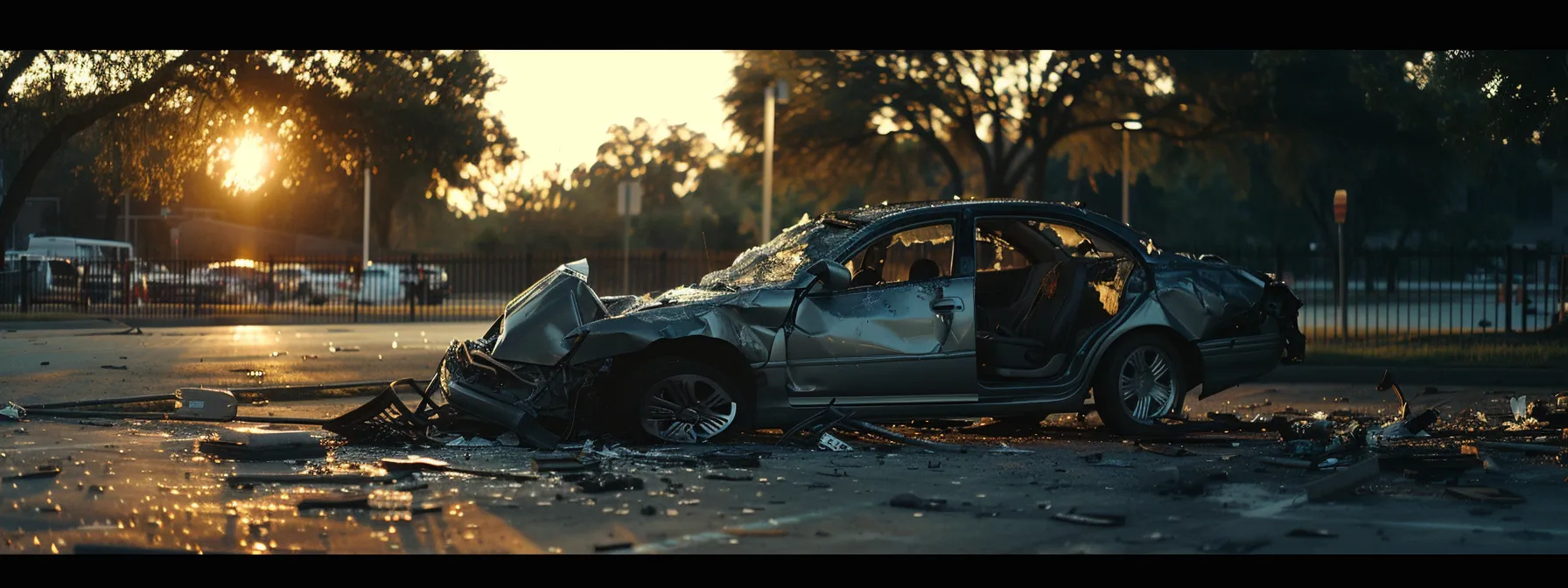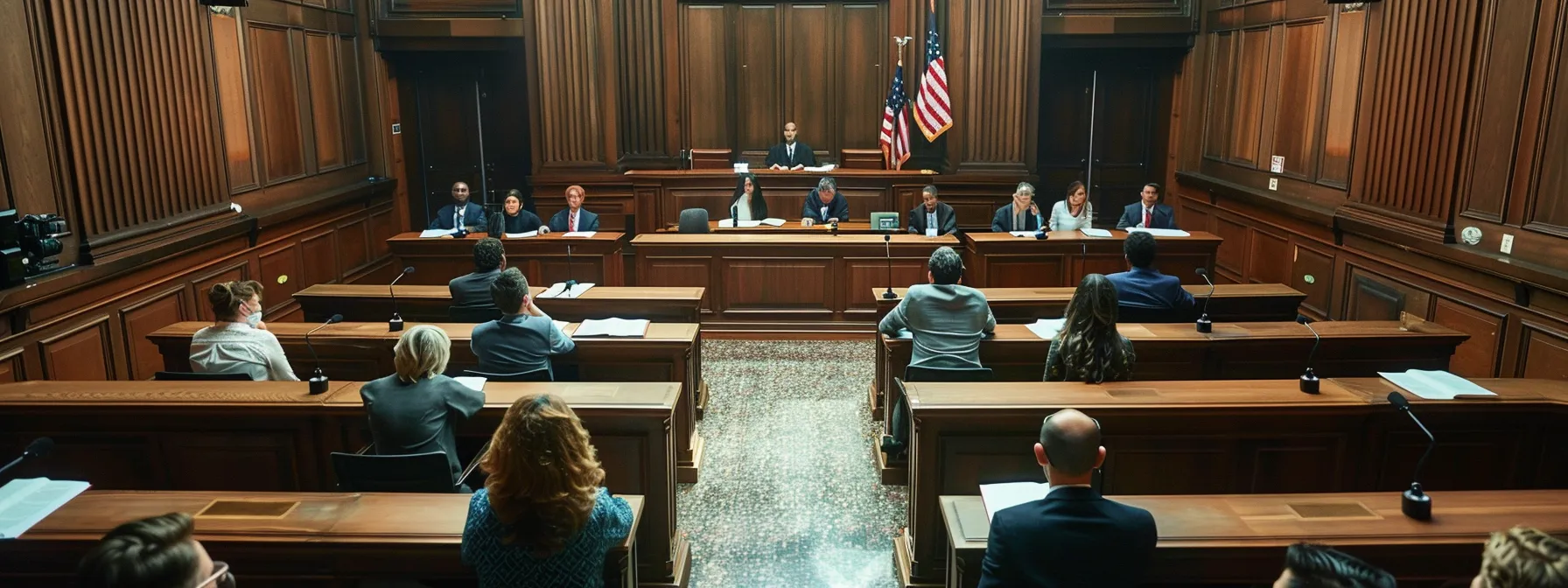Navigating the aftermath of a car accident in Texas can be as challenging as the congested roads that may have led to the collision. This post will illuminate the average settlement amounts for car accidents in the Lone Star State and the variables that can affect compensation. Readers will gain insights into the types of recoverable damages and how settlements are calculated, empowering them with knowledge to maximize their potential compensation. For those grappling with the complexities of liability insurance and seeking personal injury services, the content ahead promises clarity. If you find yourself at a crossroads after a car accident, visit Heil Law Firm or contact us to explore how we can guide you toward the resolution you deserve.
Key Takeaways
- Texas law allows for compensation even if the victim is partly at fault
- Immediate evidence collection post-accident is crucial for a strong settlement claim
- Insurance adjusters play a key role in determining the settlement amount
- Legal expertise is vital in navigating the complexities of car accident settlements
- Settlements consider both economic damages and emotional distress for comprehensive recovery
Overview of Car Accident Settlements in Texas

When individuals sustain injuries from a car accident in Texas, navigating the settlement process becomes a critical step towards recovery. This process involves understanding legal requirements for filing a claim, the pivotal role of insurance companies, and the importance of timely action to secure compensation. Each case hinges on unique factors, such as police reports and medical records, which can significantly influence the outcome of a lawsuit. The forthcoming sections will delve into these aspects, offering a comprehensive guide to the intricacies of car accident injury settlements. For more information, contact us or Visit Heil Law Firm for personal injury services.
Understanding the Settlement Process
In the aftermath of a vehicle collision, the settlement process commences with an evaluation of negligence, which determines the party at fault. This assessment is crucial as Texas operates under a modified comparative negligence rule, meaning compensation can be diminished if the injured party is partly responsible. A demand letter, detailing the injuries, property damage, and the compensation sought, is then sent to the insurance company, setting the stage for negotiations.
Compiling robust evidence is essential to substantiate the claim, including medical records, police reports, and witness statements. These documents not only establish the extent of the injuries and property damage but also help in demonstrating the other party’s negligence. The strength of this evidence often dictates the leverage one has in negotiating a fair settlement:
- Collection of evidence post-accident.
- Assessment of negligence and liability.
- Preparation and submission of the demand letter.
- Negotiation with the insurance company.
Legal Requirements for Filing a Claim
In Texas, the legal journey to a car accident settlement begins with the filing of a claim, which must adhere to specific policy guidelines and statutory requirements. The injured party must demonstrate that the accident resulted in injuries such as spinal cord damage, concussions, or shoulder trauma, which are often central to the claim’s value. This process includes a discovery phase, where evidence is gathered and scrutinized, ensuring that all relevant facts are brought to light to support the injured party’s case.
It is imperative for claimants to understand that Texas law imposes a statute of limitations, which dictates the timeframe within which a claim must be filed. Failure to initiate legal proceedings within this period could result in the loss of the right to compensation. For those suffering from severe injuries, such as a spinal cord injury or concussion, swift action is crucial to secure the necessary financial support for medical treatment and rehabilitation.
The Role of Insurance Companies
Insurance companies play a pivotal role in the settlement of car crash claims in Texas. The negotiation process with insurers is often complex, as they assess the claim’s validity and the extent of personal injury sustained. Their evaluation can include reviewing medical reports, scrutinizing the circumstances of the accident, and determining the applicability of punitive damages, if any. It is the insurer’s responsibility to offer a settlement that reflects the damages incurred, within the confines of the policy and the statute.
For many claimants, the interaction with insurance companies can be daunting, especially when it involves substantial negotiations over compensation. Expertise in personal injury law is crucial to navigate these discussions effectively, ensuring that the injured party’s rights are upheld and that they receive a fair settlement. The following list outlines the typical stages of dealing with insurance companies post-accident:
- Initial claim filing and notification to the insurance company.
- Insurance adjuster’s investigation of the accident details and damages.
- Review and analysis of personal injury claims and associated costs.
- Settlement offer and negotiation to reach an agreeable compensation amount.
Time Limits for Pursuing Compensation
In Texas, the statute of limitations sets a definitive period within which individuals must file a claim for compensation following a car accident. This time frame is crucial for those suffering from injuries, whether it’s a bone fracture requiring extensive therapy or emotional distress. Victims of a Dallas car accident, for instance, have a limited window to seek legal redress, making it imperative to act promptly to uphold their right to compensation for their suffering and losses.
Understanding the statute of limitations is not just about adhering to legal timelines; it’s about ensuring that the injured receive the justice and financial support they need for recovery. Delaying action can lead to the forfeiture of compensation for medical expenses, therapy sessions, and other damages. It is essential for individuals to recognize the urgency of initiating the legal process to secure the resources necessary for healing and restitution.
Average Settlement Amounts for Texas Car Accidents

Settlement amounts for car accidents in Texas can vary widely, influenced by factors such as the severity of injuries and the specifics of the insurance policy involved. This section will explore typical compensation ranges, delve into the elements that shape settlement values, and provide examples of settlement cases in Texas. Whether it’s a straightforward fender bender or a complex wrongful death claim, understanding these variables is crucial. The discussion will also touch on the nuances of truck accident settlements, offering insights into the legal landscape of vehicular incident compensation.
Typical Compensation Ranges
Compensation for Texas car accidents is not uniform, as it hinges on the specifics of each case, including the behavior of the driver at fault and the impact on the passenger. A lawyer specializing in personal injury can provide insight into the likely range of settlements, which can span from modest amounts for minor injuries to substantial sums for severe, life-altering conditions. The expertise of a seasoned attorney is invaluable in navigating the complexities of Texas law to secure a fair settlement.
Settlements are influenced by the degree of fault, the severity of injuries, and the insurance policy limits. For instance, if a passenger sustains significant injuries due to another driver’s reckless behavior, the compensation could be higher, reflecting the need for ongoing medical care and potential loss of income. The following table illustrates typical compensation ranges for various injury severities in Texas car accidents:
| Injury Severity | Typical Compensation Range |
|---|---|
| Minor Injuries | $10,000 – $25,000 |
| Moderate Injuries | $25,000 – $75,000 |
| Severe Injuries | $75,000 – $200,000+ |
Factors Influencing Settlement Values
The valuation of a car accident settlement in Texas is significantly affected by the intensity of the victim’s pain and suffering. For instance, East Texas courts may award higher compensation for chronic pain that impairs an individual’s daily activities. Mediation often plays a role in these cases, providing a platform for both parties to discuss the impact of the injuries and negotiate a fair settlement without resorting to a trial.
Another critical factor is the insurance company’s conduct during the claim process. Instances of bad faith, such as unjustified denial of a claim or failure to investigate promptly, can influence settlement values. Texas statistics indicate that when bad faith is evident, claimants may be entitled to additional compensation, which serves as a deterrent against such practices by insurers:
- Assessment of pain and suffering and its long-term effects.
- Mediation efforts to reach a settlement that acknowledges the full scope of the victim’s injuries.
- Evaluation of the insurance company’s response to the claim, including any bad faith actions.
- Consideration of statistical data to inform the expected compensation range.
Examples of Settlement Cases in Texas
In Texas, settlement cases often reflect the complexity of pain and suffering endured by the victims. For example, a claim involving soft tissue injuries, which are not always apparent on medical imaging but cause significant discomfort, can result in substantial compensation. This is particularly true when the victim’s message to the jury conveys the extent of their ongoing pain, leading to a settlement that includes money for both immediate and future medical care.
Another illustrative case might involve premises liability, where a person suffers injuries due to unsafe conditions on someone else’s property. In such instances, the settlement amount may factor in the severity of the injury and the negligence of the property owner. The following list represents the typical progression of a premises liability case:
- Identification of the unsafe condition that led to the injury.
- Documentation of the injury and its impact on the victim’s life.
- Negotiation with the property owner’s insurance company for fair compensation.
These examples underscore the importance of a thorough understanding of Texas law and the nuances of personal injury claims. They serve as a testament to the fact that each case is unique, with settlements reflecting the individual circumstances and the ability of the legal representation to articulate the client’s experience of pain and suffering.
Factors Influencing Compensation in Car Accident Cases

In the realm of personal injury cases in Texas, several factors critically influence the compensation awarded in car accident settlements. The severity of injuries and associated medical expenses, determination of fault and liability, and the profound impact of lost wages and future earnings are pivotal considerations. Additionally, the role of pain and suffering damages and the effect of policy limits on settlements cannot be overstated. These elements shape the financial outcomes for patients, pedestrians, and families affected by wrongful death. They help ensure that justice follows vehicular tragedies.
Severity of Injuries and Medical Expenses
The severity of injuries sustained in a car accident case is a primary determinant of the compensation amount. Medical expenses, from immediate emergency care to long-term rehabilitation, can be financially overwhelming for victims. An insurance company will scrutinize medical reports and bills to assess the settlement value, often relying on witness statements to corroborate the extent of injuries and their impact on the claimant’s life.
When evaluating a car accident case, lawyers consider more than just the cost of medical treatment. They also factor in the long-term prognosis and any future medical care required for the settlement. This ensures the responsible party bears the financial burden of the accident, not the victim. The following table illustrates the relationship between injury severity and medical expenses:
| Injury Severity | Medical Expenses |
|---|---|
| Minor Injuries | Emergency care, follow-up visits |
| Moderate Injuries | Extended treatment, physical therapy |
| Severe Injuries | Surgeries, long-term rehabilitation, ongoing care |
Determining Fault and Liability
In the context of car accident claims in Texas, establishing fault and liability is a cornerstone of the legal process. The principle of comparative negligence is applied, which can reduce the claimant’s compensation if they are found to share a portion of the blame. For instance, in cases involving drunk driving, the driver’s impairment is a clear breach of duty, simplifying the determination of fault. However, in accidents where both parties may have contributed to the collision, the strain on the claimant to prove the other’s greater fault is significant.
Accurately determining liability in an accident in Texas requires a meticulous examination of all evidence, from traffic camera footage to eyewitness accounts. This scrutiny is essential, as the outcome directly impacts the compensation awarded to the victim. Legal professionals skilled in car accident claims navigate these complexities to protect their clients’ rights. They expertly address the nuances of comparative negligence to maximize rightful compensation.
Impact of Lost Wages and Future Earnings
The financial toll of lost wages and future earnings is a significant concern for victims of car accidents in Texas. Personal injury lawyers meticulously calculate these losses to ensure that settlements adequately compensate for the time victims are unable to work and the potential impact on their future earning capacity. This is particularly vital when injuries from a car wreck or a slip and fall lead to long-term disability, disrupting careers and livelihoods.
Health care costs and the distress associated with lost wages can compound the challenges faced by those recovering from an accident. Texas personal injury attorneys advocate for their clients, arguing for settlements that reflect not only immediate medical expenses but also the profound effect on an individual’s financial stability and quality of life. The following list represents the critical steps in this process:
- Evaluation of current lost wages due to the accident.
- Projection of future earnings loss, considering the victim’s career trajectory and the injury’s impact.
- Assessment of the overall financial distress caused by the accident.
Role of Pain and Suffering Damages
The role of pain and suffering damages in Texas car accident settlements is a critical component that goes beyond the tangible costs of medical bills and lost income. When a motor vehicle accident occurs, perhaps due to a driver running a stop sign in West Texas, the claims adjuster must account for the non-economic trauma endured by the victim. These damages are quantified based on the severity of the pain and the extent to which the injuries have disrupted the victim’s life.
For instance, a victim who can no longer engage in daily activities or hobbies due to chronic pain may be entitled to higher compensation for pain and suffering. The claims adjuster’s evaluation of these damages is pivotal, as they directly affect the overall settlement offer. The following list outlines the journey of a claim involving pain and suffering damages:
- Documentation of the victim’s physical and emotional distress post-accident.
- Claims adjuster’s assessment of the impact on the victim’s quality of life.
- Negotiation of pain and suffering compensation as part of the final settlement.
Effect of Policy Limits on Settlements
In the landscape of Texas car crash settlements, policy limits set by insurance companies can significantly restrict the compensation available to victims. When a motor vehicle accident results in extensive back pain or other serious injuries, the policy’s maximum payout may fall short of covering all medical expenses and losses. It is imperative for individuals to seek legal advice to understand how these limits can affect their claim and explore all avenues for adequate compensation under personal injury law.
Moreover, when the damages exceed the at-fault party’s policy limits, victims may face challenges in obtaining full restitution for their losses. In such scenarios, personal injury law may allow for the pursuit of additional assets or alternative policies to cover the shortfall. This highlights the need for thorough legal guidance to navigate the complexities of motor vehicle accident claims and protect victims from financial disadvantages caused by policy limitations.
Types of Recoverable Damages in Texas

In Texas, victims of car accidents may seek various forms of compensation, encompassing economic damages for medical bills and property loss, including property damage claims. Non-economic damages address emotional distress, while punitive damages may apply in severe cases. The process also involves calculating future medical needs, which may range from ongoing therapy for whiplash to surgeries. The subsequent sections will dissect these categories, offering insights into how a jury reaches a verdict and the factors that influence the final compensation amount.
Economic Damages: Medical Bills and Property Loss
In Texas courts, economic damages awarded in car accident settlements typically cover the cost of medical bills and property loss. These damages are quantifiable financial losses that the plaintiff incurs as a direct result of the accident. Insurance companies are often involved in the settlement process, evaluating bodily injury claims to determine the extent of compensation for medical treatments, vehicle repairs, or replacement costs that the defendant is liable for.
Accurate documentation of all expenses related to the accident is crucial for victims seeking to recover economic damages. This includes detailed medical invoices for emergency services, ongoing care, and any specialized treatments required for full recovery. The court evaluates these tangible costs and awards settlements to prevent victims from facing financial burdens caused by another party’s negligence.
Non-Economic Damages: Emotional Distress
In the realm of Texas law, non-economic damages such as emotional distress play a significant role in car accident settlements. Victims who have endured the trauma of a highway collision or a hit and run incident often face psychological hurdles that are not immediately visible, unlike a broken hip or the need for medication. These damages are crucial as they acknowledge the invisible wounds and provide compensation for the mental anguish and emotional turmoil that can persist long after the physical injuries have healed.
Legal professionals in Texas understand that the impact of emotional distress can be as debilitating as physical injuries. For instance, a victim may experience anxiety every time they drive past the site of their accident or might suffer from post-traumatic stress that disrupts their daily functioning. The law allows for these experiences to be quantified into a monetary value, ensuring that individuals receive the justice and support they need to navigate the path to emotional recovery.
Punitive Damages in Severe Cases
In severe cases of vehicle accidents in Texas, where egregious negligence or intentional harm is evident, punitive damages may be awarded. These damages serve as a financial penalty to the at-fault party, particularly in instances of brain damage or other catastrophic injuries. They are designed not only to compensate the victim but also to deter similar conduct in the future, reinforcing the message that reckless behavior on the road has severe consequences.
For example, in a class action lawsuit involving a vehicle accident where a defective knee airbag resulted in significant injuries, punitive damages might be pursued. This table illustrates the relationship between the severity of the injury and the potential for punitive damages:
| Injury Severity | Potential for Punitive Damages |
|---|---|
| Minor Injuries | Low |
| Severe Injuries (e.g., brain damage) | High |
| Property Damage | Varies |
Courts consider and award punitive damages to address the gravity of the situation when property destruction occurs or a victim suffers long-term disabilities. Victims consult knowledgeable attorneys, who assess their cases and pursue the full spectrum of damages on their behalf.
Calculating Future Medical Needs
Calculating future medical needs is a critical component of securing a fair settlement for car accident victims in Texas, particularly for those facing long-term disability. Expert testimony often plays a pivotal role in projecting the costs of ongoing physical therapy, surgeries, and any necessary adaptive equipment. This foresight ensures that individuals are not left financially burdened by the aftermath of an accident and can maintain their quality of life.
Courts evaluate and award additional compensation when a victim’s injuries cause a loss of consortium or companionship. Personal testimony substantiates claims for future medical and emotional support by highlighting how a disability affects the victim’s relationship with their spouse or family. Understanding dram shop laws ensures individuals explore all potential avenues for compensation in alcohol-related accidents that require long-term care.
How Settlement Amounts Are Calculated

Calculating an accident settlement in Texas involves a blend of methodical approaches and strategic considerations. Insurance adjusters, guided by practices recommended by the Insurance Information Institute, meticulously review documentation and evidence to assess the value of a car accident claim. The multiplier method is often employed to quantify pain and suffering, especially in cases involving injuries like a sprain. Additionally, negotiation strategies are crucial in ensuring that victims of personal injury lawsuits receive fair compensation. The following sections will break down these processes and show how settlements determine.
Methods Used by Insurance Adjusters
Insurance adjusters in Texas employ a meticulous approach when calculating settlement amounts, guided by regulations from the Texas Department of Insurance. They assess the risk associated with the claim, examining factors such as the claimant’s medical expenses, documented by a physician, and any potential product liability issues. This process ensures that the compensation offered aligns with the pursuit of justice for the injured party, reflecting the true cost of their losses and suffering.
In their quest to determine fair compensation, adjusters also consider the long-term implications of the injury on the claimant’s life. They evaluate reports from medical professionals and scrutinize evidence of ongoing treatment needs, which may influence the risk assessment and, consequently, the settlement amount. Their analysis is critical in ensuring that victims receive the financial support necessary to address the full extent of their injuries and secure their right to justice.
Importance of Documentation and Evidence
The plaintiff’s ability to present comprehensive documentation and evidence is paramount in the calculation of a car accident settlement in Texas. Detailed medical records, repair bills, and proof of lost wages form the bedrock of a claim, substantiating the cost incurred due to the accident. Without this evidence, establishing the full extent of damages, especially in cases of gross negligence, becomes significantly more challenging.
Moreover, the presence of a warranty or guarantee can influence the settlement amount, particularly if a defective vehicle component contributed to the accident. In such instances, the plaintiff must provide evidence that the warranty was breached, which can lead to a higher compensation due to the manufacturer’s liability. The following list outlines the key documents required in a car accident settlement case:
- Medical reports and bills documenting injuries and treatments.
- Receipts for vehicle repairs or replacement costs.
- Records of lost income and any other financial losses related to the accident.
- Evidence of warranty or product liability if applicable.
It is crucial for the plaintiff to gather and organize all pertinent documentation promptly, as this evidence will be the foundation of their claim. A well-documented case can lead to a more accurate assessment of the settlement value, ensuring that the plaintiff is justly compensated for their losses and suffering.
The Multiplier Method for Pain and Suffering
The multiplier method actively quantifies non-economic damages, such as pain and suffering, in car accident settlements in Texas. This method involves multiplying the total economic damages, like medical bills and lost wages, by a certain number that reflects the severity of the anguish experienced. For instance, a commercial vehicle accident resulting in long-term injury might warrant a higher multiplier due to the increased complexity and potential impact on the victim’s health insurance and financial stability.
When applying the multiplier method, the specific circumstances of each accident are carefully considered. The multiplier reflects the intensity of the victim’s suffering, with more severe cases involving chronic pain or significant emotional distress typically resulting in a higher figure. This method ensures that compensation for pain and suffering aligns with the unique hardships endured by the victim, offering a measure of relief and acknowledgment of their ordeal.
Negotiation Strategies for Fair Compensation
Effective negotiation strategies are essential for securing fair compensation in Texas car accident settlements. For instance, when a traumatic brain injury occurs due to a motorcycle or car accident, the urgency for a substantial settlement is heightened. Legal representatives must be adept at presenting compelling evidence, including emergency room records and expert testimony, to illustrate the severity of the injury and justify the need for adequate compensation. This approach can significantly influence the outcome, often leading to a more favorable settlement without the need for a protracted trial.
In the negotiation phase, the goal is to reach an agreement that fully addresses the victim’s damages and losses. Skilled negotiators leverage their understanding of Texas personal injury law to advocate for their clients, emphasizing the long-term effects of the accident. By focusing on the tangible and intangible impacts, such as ongoing medical needs and emotional distress, they work to ensure that the settlement reflects the true extent of the harm suffered, thereby providing their clients with the financial support necessary for a comprehensive recovery.
Maximizing Your Car Accident Settlement

Securing the highest possible settlement in car accident cases requires immediate and strategic action post-collision. Victims must be vigilant in taking the right steps, paying close attention to their neck and other injuries, and avoiding missteps that could diminish their compensation. Expert legal representation can be instrumental in navigating the complexities of Texas law, ensuring one’s rights are fully exercised. Preparation for negotiations or trial is also critical, as it can significantly influence the outcome of a claim. This section will explore these essential strategies to maximize compensation in car accident settlements.
Steps to Take Immediately After an Accident
Immediately following a car accident in Texas, it is imperative for individuals to document the scene and gather evidence, as this can be pivotal in the settlement process. Taking photographs of the vehicles, road conditions, and any visible injuries, as well as collecting contact information from witnesses, provides a foundation for a strong claim. This swift action aids in constructing a clear narrative of the incident, which is essential when seeking fair compensation.
Seeking medical attention without delay is also crucial, even if injuries seem minor at first. A thorough medical evaluation creates an official record, which is indispensable for substantiating the extent of injuries related to the accident. This step not only ensures proper care for the individual but also bolsters the integrity of their claim, enhancing the prospects of a maximized settlement.
Avoiding Common Mistakes That Reduce Compensation
One common pitfall that can lead to reduced compensation in Texas car accident settlements is accepting an initial offer too quickly. Victims should resist the urge to settle prematurely, as early offers from insurance companies often fail to cover the full extent of damages and long-term costs associated with the accident. It is crucial to consult with a personal injury attorney who can provide a comprehensive assessment and negotiate for a settlement that truly reflects the impact of the accident on the victim’s life.
Another mistake that can diminish a car accident settlement is the failure to document injuries and property damage comprehensively. In the wake of an accident, individuals should meticulously record all medical treatments, rehabilitation expenses, and any property repairs. This documentation serves as the backbone of the claim, and without it, victims may find their compensation significantly undercut. Legal experts emphasize the importance of a well-documented case to ensure victims in Texas receive the full compensation they deserve.
Benefits of Legal Representation
Engaging a seasoned personal injury attorney can significantly enhance the prospects of a favorable car accident settlement in Texas. Legal representation provides extensive knowledge in navigating the complexities of Texas law. Attorneys handle all facets of the case, from collecting evidence to negotiating with insurance companies, with expertise. This professional guidance is instrumental in advocating for the victim’s rights and securing a settlement that comprehensively addresses the full spectrum of their losses and injuries.
Moreover, an attorney’s negotiation skills are invaluable in maximizing compensation, particularly when dealing with insurance adjusters who are adept at minimizing payouts. A lawyer’s ability to construct a compelling case, backed by solid evidence and a strategic approach to settlement discussions, can lead to significantly higher compensation for the client. This legal support is crucial in alleviating the burden on the victim, allowing them to focus on recovery while their representative works tirelessly to ensure justice is served.
Understanding Your Rights Under Texas Law
Under Texas law, individuals involved in car accidents have the right to seek compensation for their injuries and losses. It is essential for victims to understand that they can recover damages not only for physical injuries but also for emotional distress and lost wages, ensuring a comprehensive approach to their financial recovery. Knowledge of these rights empowers individuals to pursue the full extent of compensation they are entitled to, with the guidance of legal expertise.
Furthermore, Texas statutes provide a framework for determining fault in car accidents, which directly affects the settlement outcome. Victims should be aware that even if they are partially at fault, they may still be eligible for compensation under the modified comparative negligence rule. Recognizing this aspect of Texas law helps individuals navigate their claims with confidence. It provides a clear understanding of how courts assess liability and how it influences their potential settlement.
Preparing for Negotiations or Trial
Preparation for negotiations or trial is a decisive phase in the pursuit of a car accident settlement in Texas. The claimant’s legal team meticulously assembles evidence, including medical records and expert testimonies, to build a robust case that substantiates the claim for damages. This groundwork is essential, as it equips the legal representative with the necessary tools to advocate effectively for the client’s rightful compensation during settlement discussions or in the courtroom.
Entering negotiations or a trial with a well-prepared case can significantly influence the settlement outcome for a car accident in Texas. The claimant must understand the value of their claim and the legal strategies they can employ. A seasoned attorney will leverage this understanding to negotiate a settlement that reflects the true extent of the claimant’s losses or to persuasively present the case before a jury, should the need for a trial arise.
Conclusion
Understanding car accident settlements in Texas is crucial for victims seeking fair compensation, as settlements vary widely based on injury severity, fault, and insurance policy limits. Proper documentation and evidence are paramount in substantiating claims, while legal expertise can significantly enhance settlement outcomes. Texas law allows for recovery of both economic and non-economic damages, ensuring a comprehensive approach to financial recovery for victims. Ultimately, a deep comprehension of these factors and the strategic preparation for negotiations or trial are vital in maximizing the compensation received for car accident injuries in Texas.







